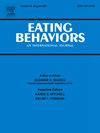Maternal postpartum depression and children's emotional overeating: The mediating role of executive function
IF 2.4
3区 医学
Q2 PSYCHIATRY
引用次数: 0
Abstract
Objectives
The literature shows connections between maternal depression, children's executive function (EF), and emotional overeating (EOE). This study examined the interplay between maternal postpartum depression, EF, and EOE. We hypothesized that higher levels of postpartum depression would lead to lower inhibition and emotional control and higher levels of EOE. We also explored whether inhibition and emotional control mediate the relationship between postpartum depression and EOE.
Methods
The analysis included 297 families (49 % of children were female at birth; 82 % of caregivers were White) from a longitudinal birth cohort study in the US Midwest (N = 468). Maternal self-reports assessed postpartum depression at six weeks using the Edinburgh Postnatal Depression Scale. Children's EF at 24 months was measured with the Behavior Rating Inventory of Executive Function-Preschool Version, and EOE at 48 months was assessed using the Child Eating Behavior Questionnaire.
Results
While accounting for child gender, parent race, and education, there was a positive indirect effect of postpartum depression on EOE through children's inhibitory and emotional control difficulties. There was also a significant direct effect between postpartum depression and EOE. These results suggest that higher levels of postpartum depression in mothers may be associated with children's lower EF abilities (e.g., inhibition and emotional control), which may, in turn, lead to higher levels of EOE.
Conclusion
Early maternal depressive symptoms may have important implications for children's EF and EOE behaviors. The current findings stress the need to address symptoms of postpartum depression in mothers, even though symptoms may not reach clinical levels.
求助全文
约1分钟内获得全文
求助全文
来源期刊

Eating behaviors
Multiple-
CiteScore
4.20
自引率
3.60%
发文量
65
审稿时长
60 days
期刊介绍:
Eating Behaviors is an international peer-reviewed scientific journal publishing human research on the etiology, prevention, and treatment of obesity, binge eating, and eating disorders in adults and children. Studies related to the promotion of healthy eating patterns to treat or prevent medical conditions (e.g., hypertension, diabetes mellitus, cancer) are also acceptable. Two types of manuscripts are encouraged: (1) Descriptive studies establishing functional relationships between eating behaviors and social, cognitive, environmental, attitudinal, emotional or biochemical factors; (2) Clinical outcome research evaluating the efficacy of prevention or treatment protocols.
 求助内容:
求助内容: 应助结果提醒方式:
应助结果提醒方式:


